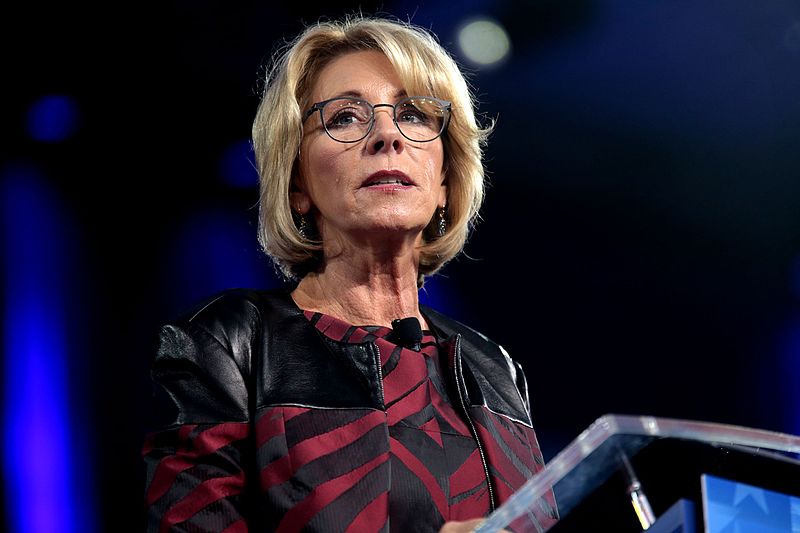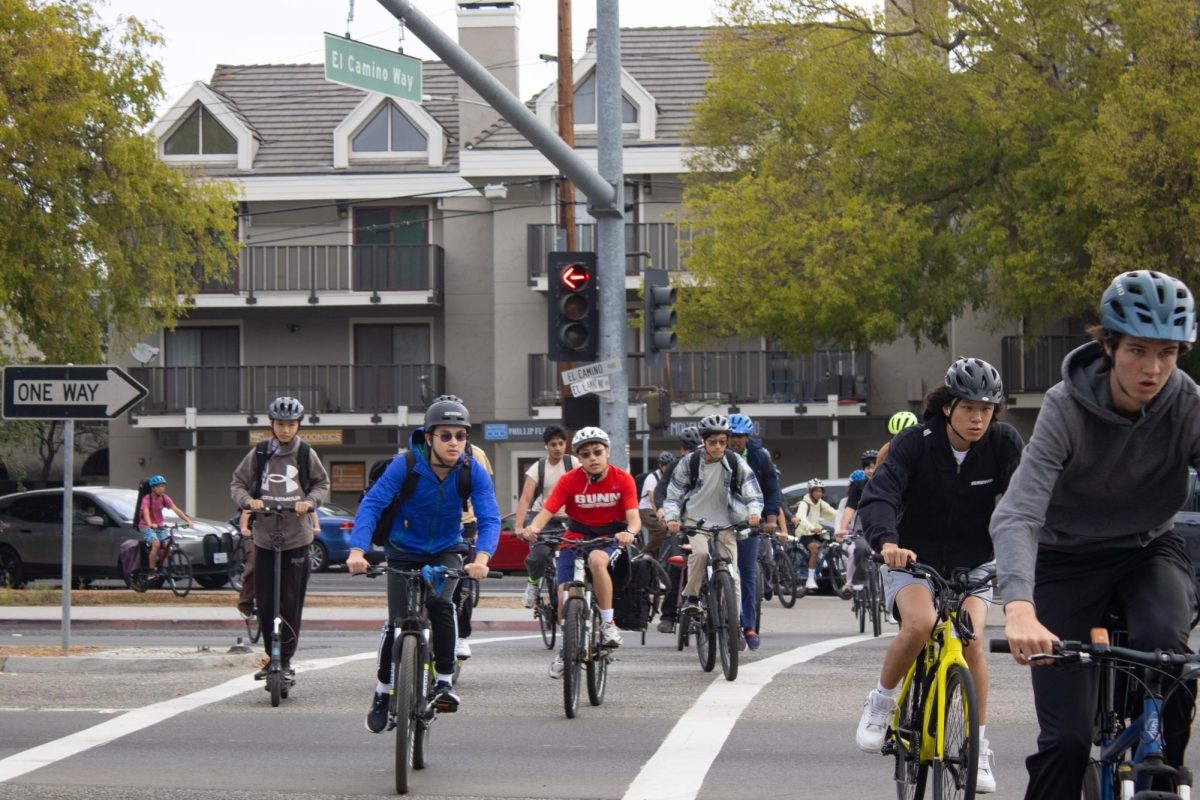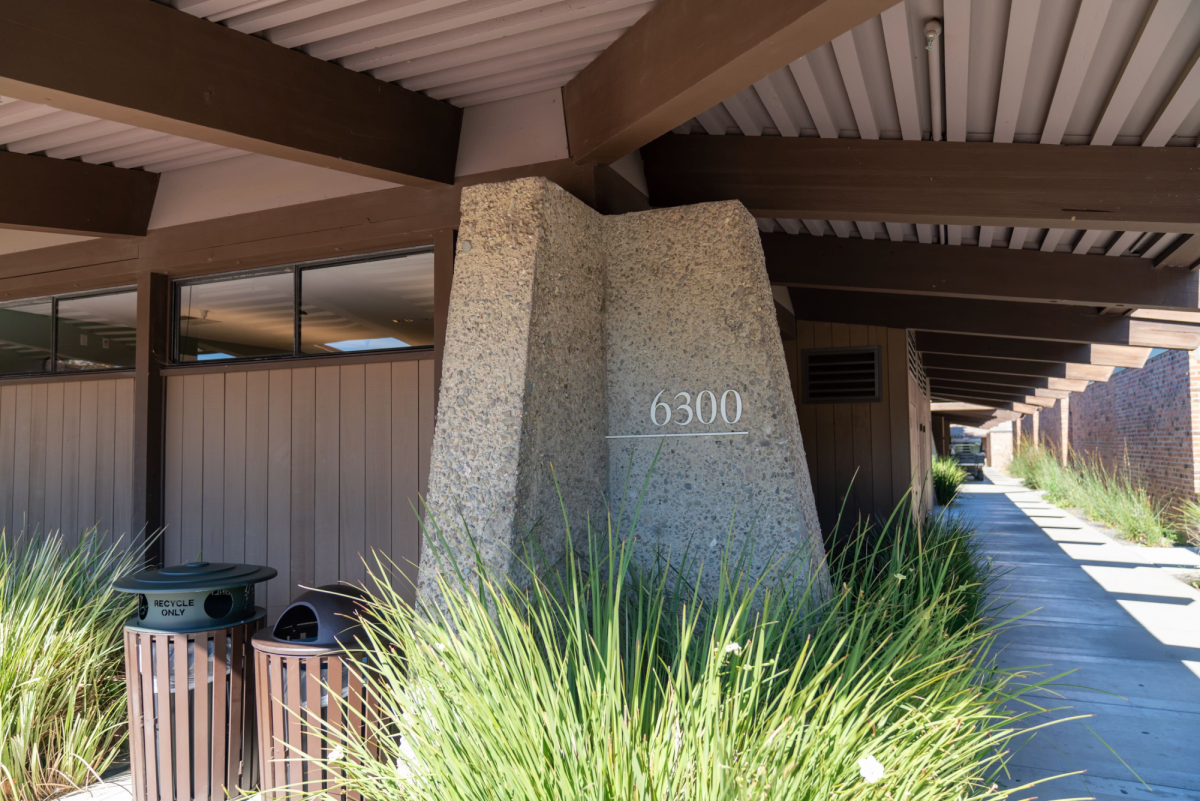Written by Helen Nguyen and Ayala Tzadikario
Betsy DeVos’ confirmation as Secretary of Education on Feb. 7 has been met with opposition by many teachers and parents across the United States due to her lack of experience working in public education. Concerns also reside in Palo Alto because of DeVos’ voucher program for private schools and ambiguity about disability and Lesbian, gay, bisexual and transgender (LGBT) rights.
Palo Alto Unified School District (PAUSD) Superintendent Dr. Max McGee believes that it would be valuable for DeVos to understand how public education is a foundational component of our democratic society. “I think she’s already learned that she has a lot to learn,” McGee said. “If she takes some time, she can understand programs, services and our best practices that should be replicated around the country. She’s not going to learn it by reading about it. She needs to get out and about and really immerse herself in public schools the first year or two on the job.”
Palo Alto Educators Association president Teri Baldwin believes that the appointment of Betsy DeVos is harmful to public schools. “She is someone who has advocated and funded initiatives for privately-managed charter schools and vouchers to private schools, both of which drain funds from public schools,” Baldwin said. Baldwin states that private and charter schools are not held to the same high standards as public schools, and that oversight is often lacking. “Teachers are not protected in those schools, so they are very fearful to advocate for their students because they are in fear of losing their jobs,” Baldwin said.
The school voucher program DeVos is advocating for is a major government program that provides low-income families, the elderly and the disabled with opportunities for better education. The voucher allows parents to use public funds to pay for their child’s private school tuition. According to the California Teachers Association (CTA), the school voucher program harms students at public schools because it takes money from public education funds. By taking money out of public school systems to let a few students attend private school, only a few benefit while most are disadvantaged because of the program.
Baldwin states that research indicates that results for charter schools are often mixed, with many performing worse than public schools. “In many cases [charter schools] have failed students, but continue to make money for their investors and CEOs,” Baldwin said. “The people who run these charter schools are in business to make money off of education—these are business people who are often not educators.”
McGee believes that if DeVos’ goal is to have a more privatized schooling system, she will not be successful. “It’s a waste of time and money, because what matters is what happens inside schools,” he said.
Baldwin is wary of DeVos’ lack of knowledge and bias towards people with disabilities and the LGBT community, and her stance on gun control. “Having someone in this important role who doesn’t have any dealings with any kind of diversity outside her realm of the wealthy white perspective and has no experience with public education should concern everyone who values these experiences in our public schools,” Baldwin said.
Principal Dr. Denise Herrmann also believes that DeVos does not truly realize what schools need to help students. According to Herrmann, education is very different from businesses since it is not about manufacturing something; rather it is about supporting students and learning. “It’s 10 times more complicated than people realize when they’re on the outside looking in,” Herrmann said. “She has a misunderstanding about all the factors that contribute to a student doing better in school.”
McGee believes that the Trump administration needs to think more deeply about the value and importance of freedom of speech. “Diversity enriches our understanding and enhances creativity,” McGee said. “I hope someone in the federal government steps up to advocate for opportunity and access for all students and embracing diversity, because I think that will strengthen our public schools and society.”
Herrmann believes public education is very important because it gives every student the opportunity to become a better and more educated person. DeVos’ disregard of public schools worries Herrmann. “I am cautious in my prediction of what may be some of her actions; her past track record definitely is in support of diverting public funds to private institutions,” Herrmann said. “I believe that is against what our country was founded on.”
DeVos has impacted Michigan the most, but not in a way that some teachers appreciated, according to Palo Alto High School (Paly) teacher Rodney Satterthwaite, who is originally from Michigan and taught there. DeVos advocated for laws that hindered teacher unions from protecting teachers’ rights, cut teachers’ benefits and salaries, increased class sizes and even closed underperforming schools. “[DeVos’ push to destroy public education] really demoralized teachers in Michigan,” Satterthwaite said. “It brought my wife and I to the point where we realized either we have to find something else to do or to start teaching elsewhere.”
Baldwin is hopeful that DeVos’ appointment will not affect students in Palo Alto. She believes that PAUSD schools are exceptional and that many in the community value the quality of the education. “I do not believe that the community would push for charter schools that will take resources away from our public schools to fund them,” Baldwin said. “We have extremely innovative programs, talented teachers and our students excel.” However, in other areas—especially more impoverished areas—Baldwin believes that DeVos’ decisions can devastate schools. “Charters and voucher programs have been proven to help the wealthy and disenfranchise poor, middle class, minority and special needs students,” Baldwin said.
As of now, McGee does not believe that DeVos will have an impact on PAUSD unless there is a major policy switch. “It really depends on her policies, but I don’t think our teachers, parents and students are going to feel it,” McGee said. According to McGee, states are responsible for education and PAUSD doesn’t receive much funding from the federal government. “Local control is a powerful principle,” McGee said. “Federal government can’t have a great impact other than through policy.”
DeVos’ focus on special education was questioned during her confirmation in which she showed a lack of understanding for laws such as the Individuals with Disabilities Education Act that ensures that students with special needs or disabilities have the opportunity to receive a free appropriate education. She later rectified that mistake in a letter she sent to Senator Isakson, a member of the Senate Education Committee. The Chair of the Palo Alto Community Advisory Committee for Special Education Kimberly Eng Lee trusts that people who need special education will be cared for here in California. “Because of strong state-level leadership in California’s education, if control is more localized, I am not as worried and we should always be vigilant about protecting students’ rights for a quality education,” Lee said.
With the help of thoughtful efforts to seek first to understand and then develop solutions for education, McGee believes that the Secretary of Education can have a positive impact on a large scale. “I think she’d be well advised to spend some time with some of her predecessors, and maybe carry on some of the good work that they started,” McGee said. “DeVos can ideally use the federal Department of Education as an opportunity to replicate what works best in education to facilitate and fund the best practices to make them accessible to all districts in our country.” McGee thinks that public policy should have long-reaching and positive impacts, and if DeVos wants to make a difference, she should work on a few major policies that are informed by both research and education’s best practices.
The federal government possesses the power to greatly impact education through policy, and McGee hopes that it uses this power to create a positive impact. “I hope it plays an important role in providing funding and support for replicating successful programs, and not just trying to be a compliant organization,” McGee said. “The Title I and IX policies—providing funding for low income families and desegregating public schools—were a great contribution by the federal government.”
Public policy is going to have a high impact even beyond our campus and school district orders, and McGee emphasizes the importance and need for students to be advocates for public education. “It’s very easy sometimes for us to focus on a local issue, whether it’s the Securly system on our Chromebooks or the weighted grading,” McGee said. “I think the student voice ought to have more of a place in state and federal policy.”











